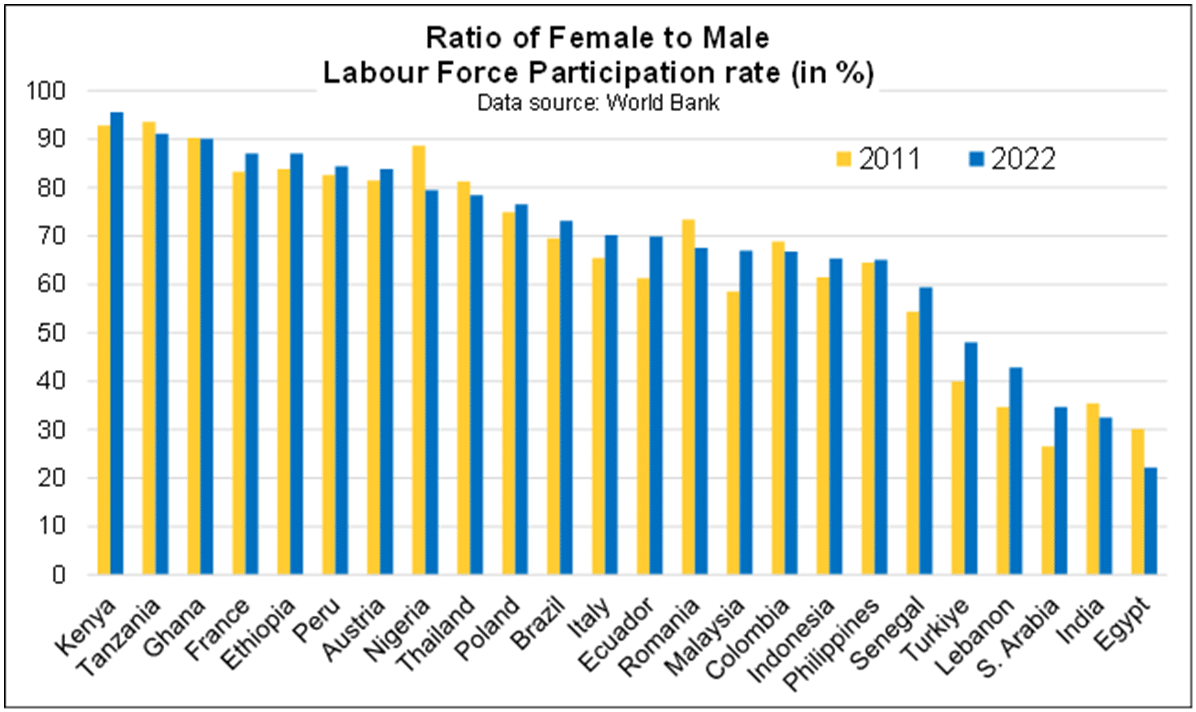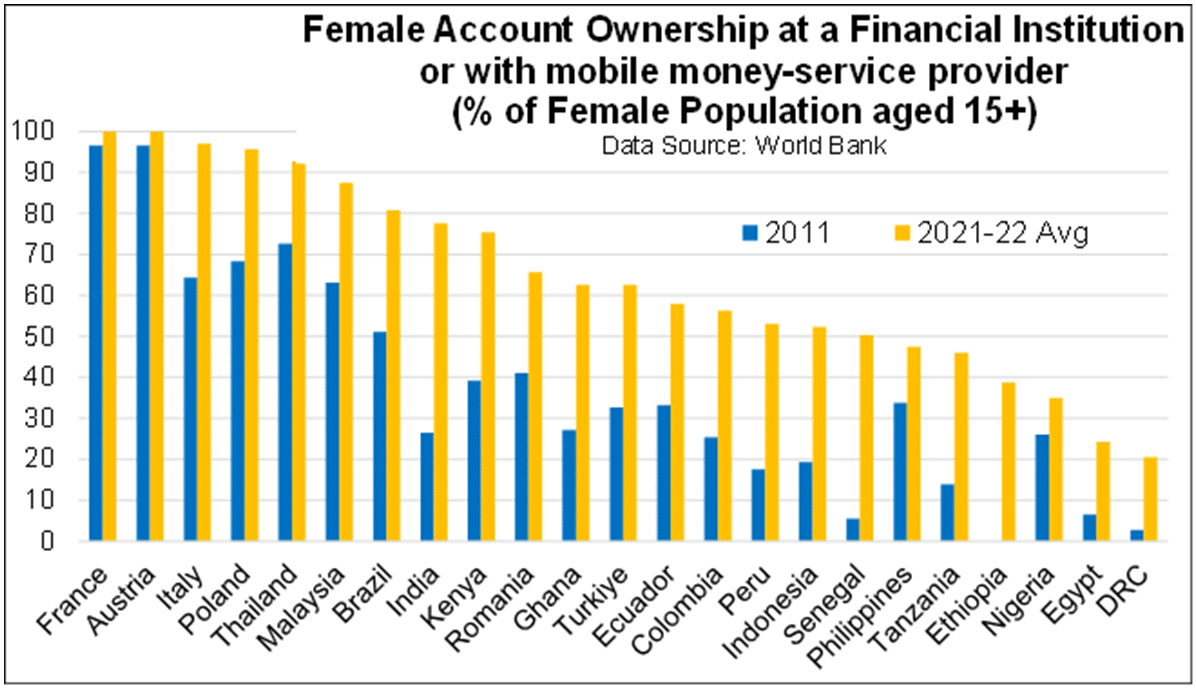
Even as we celebrate the progress made in gender equality and women’s empowerment in emerging markets (EMs) and beyond, we must recognise the significant work that remains.
Labour force participation
Labour force participation rates are a critical metric of gender equality and economic development. World Bank data on female-to-male labour force participation highlights significant disparities across the EM universe. In regions such as the Middle East and India, these ratios remain notably lower while Africa’s ratio is one of the highest in the world and on par with that of China and North America, according to McKinsey research. Notably, Africa has also made strides in increasing female representation on executive committees and boards, with the highest board-level representation globally. However, most African women still work in low-paid, often subsistence-level jobs in the informal economy and, as evidenced by Chart 2, do not have matching access to financial services.
Governments are taking action on female labour participation. For example, Saudi Arabia has prioritised increasing women’s participation in the workforce as a core component of its Vision 2030 initiative, recognising that economic growth and gender equality are deeply intertwined. However, it takes more than government policy to destroy the structural barriers that prevent women from fully participating in the workforce. Cultural norms and expectations, impaired access to education and childcare facilities are just a few of the obstacles that need to be addressed. We have been a proud supporter of EMpower – The Emerging Markets Foundation – a philanthropic organisation that supports a multitude of women- and adolescent girl-focused programmes, dedicated to life skills, leadership, livelihoods and sexual and reproductive health. Meaningful progress is only possible through community-wide engagement with parents, elders, male peers, educators and the authorities and it takes time.


Access to water and sanitation
In many emerging markets women dedicate their daily time to a number of vital activities, ranging from generating an income, looking after children and elders to securing water supply for their homes by fetching water from sources that could be miles away.
Access to water from close and reliable sources has a positive impact on women’s lives, with benefits that go beyond well-being and health: dignity, ability to protect their families from disease, access to income opportunities by not having to spend time searching for water. Girls, who are usually assigned to this activity, can devote time to attending school and receiving a formal education and enjoying their childhood.
In Angola, Gemcorp Capital is financing a number of important infrastructure projects, including universal access to water with the Águas de Benguela, EPAL’s Sistema III, Quilonga Grande projects, as well as projects to combat drought in southern Angola in the provinces of Cunene and Huíla, which will guarantee access to water throughout the year, thus preventing families from constant need to migrate and enabling food security for the communities. These projects underway will benefit around 24 million people.
Technology driving progress
Mobile telephony has revolutionised access to financial services, particularly for women and rural populations. Since 2000, mobile phone usage has surged in EM countries, often surpassing that of developed markets. One company driving data access across a number of African countries is Africell, part of Gemcorp’s investment portfolio. Africell is a fast-growing mobile network operator that provides affordable and reliable mobile network coverage to over 12 million subscribers across Africa. Their services include voice, data and mobile money, significantly contributing to economic growth. The rapid spread of mobile communications has had a profound impact on rural areas, where traditional infrastructure – both telephony and banking – is often lacking. This technological leap has empowered many women by providing financial inclusion through mobile payment services, enabling them to start businesses and achieve financial independence. The World Bank emphasises that no technology has spread faster globally than mobile communications, underscoring its critical role in development.
Jumo, a financial technology platform provider and another one of our investee companies, is a major force in driving financial inclusion and development in Africa. One-third of Jumo’s 24 million unique customers are women and Jumo’s AI-powered scoring models are gender-, age- and ethnicity-blind. By leveraging technology, women can overcome prejudice and gain equal access financial services to improve their economic standing and gain greater autonomy. Financial inclusion is a cornerstone of women’s empowerment, allowing women to save money, invest in education and health, and build businesses. Supporting these innovative businesses through investment and policy measures is crucial for fostering sustainable development.
The road ahead
This is just a glimpse of the multitude of interventions that are crucial to supporting the women of emerging markets in their quest for equity and equality. Securing global financing for Africa and other rapidly growing emerging markets regions is essential. Policymakers, businesses, investors and civil society must work together to create inclusive policies, invest in women-focused initiatives, and ensure that technological and economic advancements benefit all.

